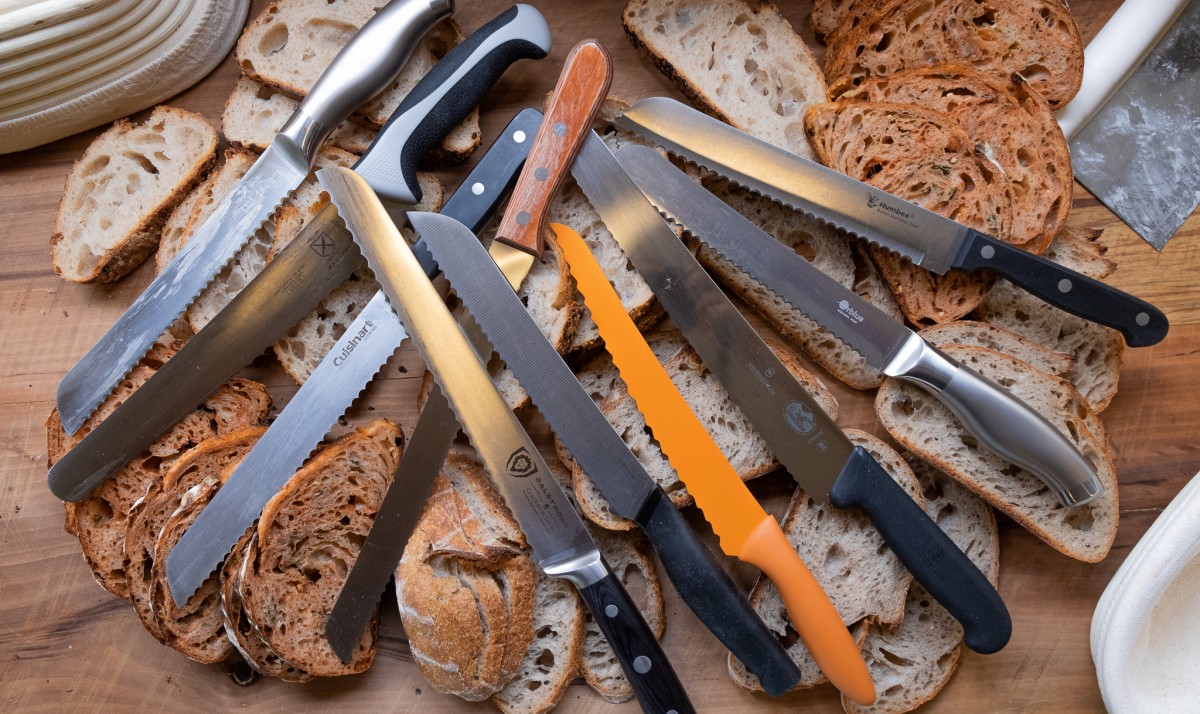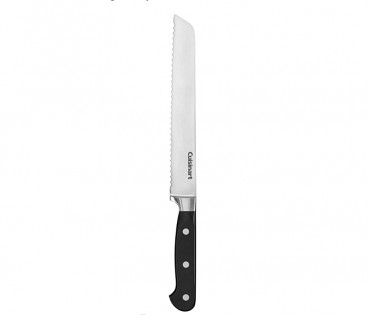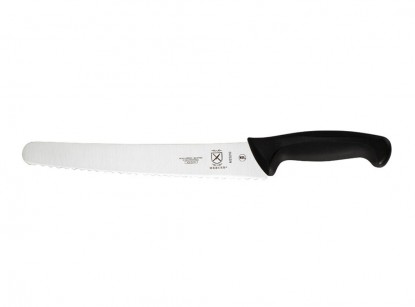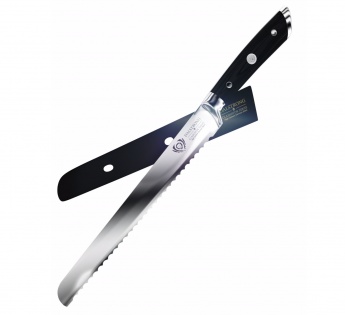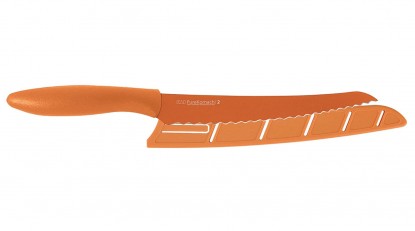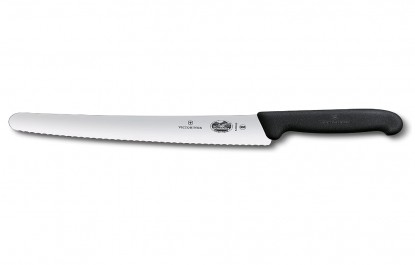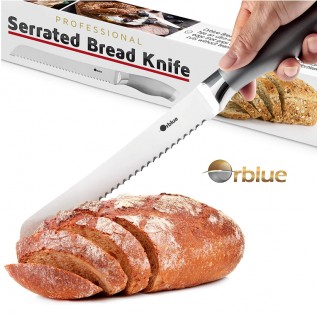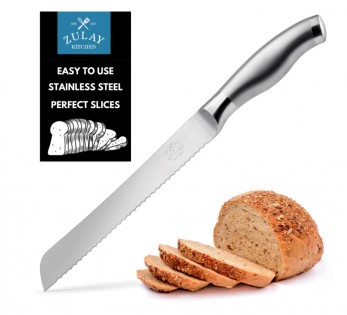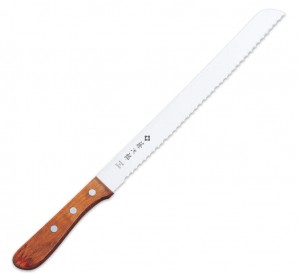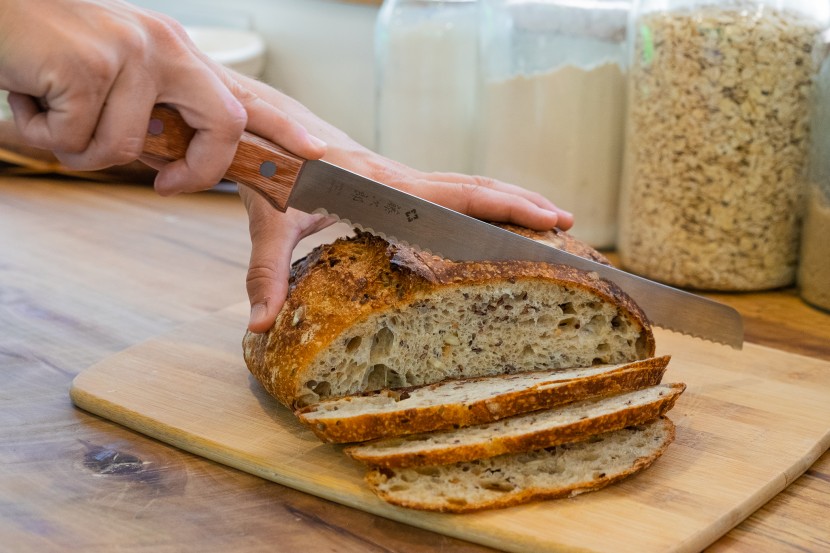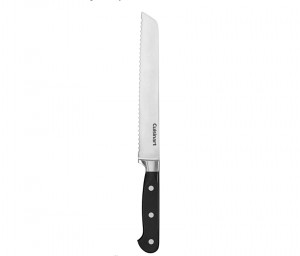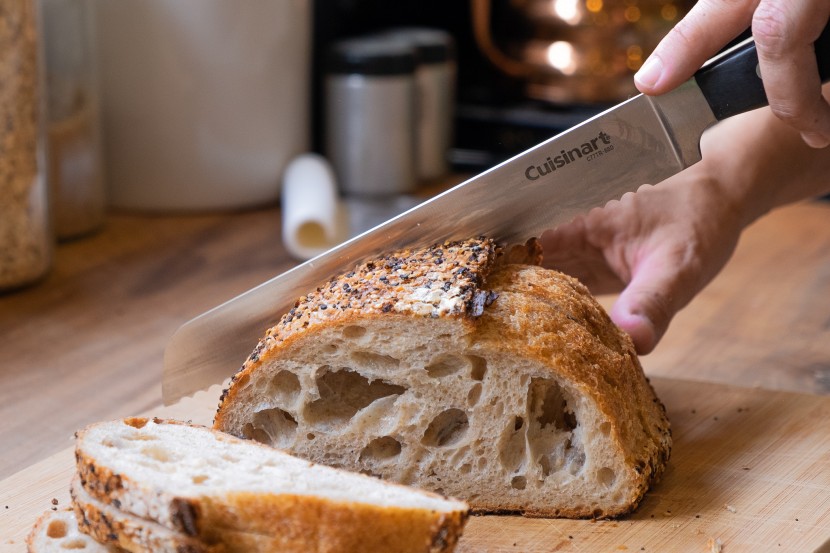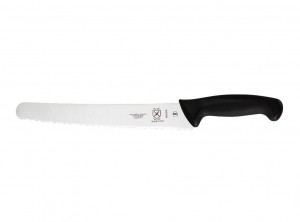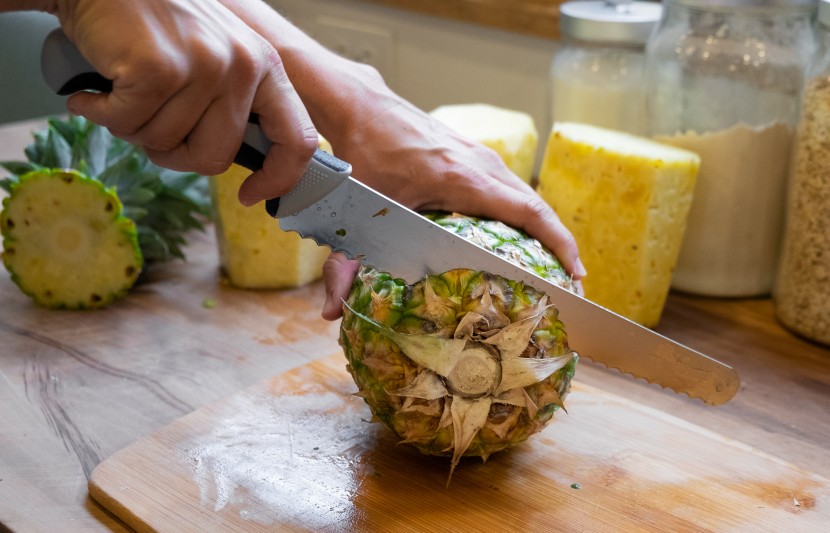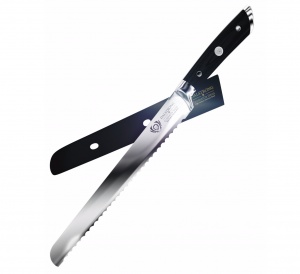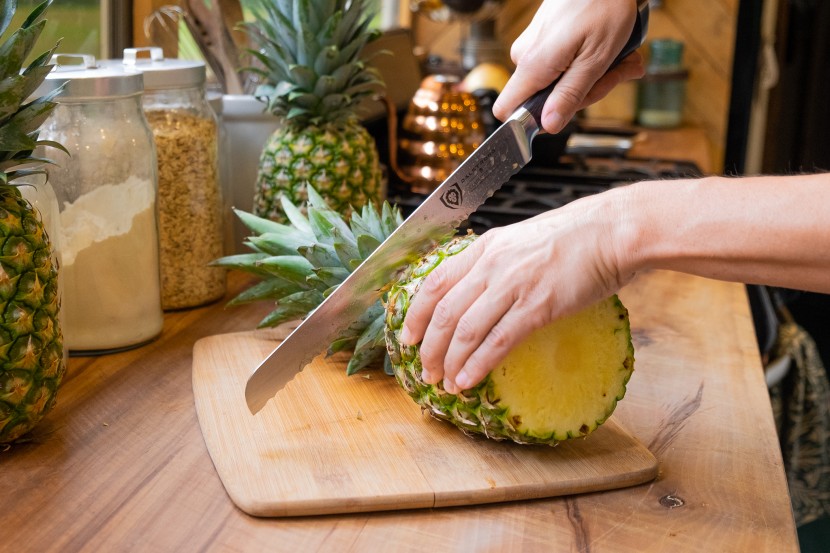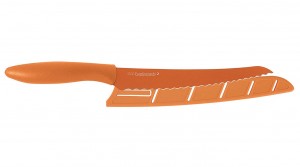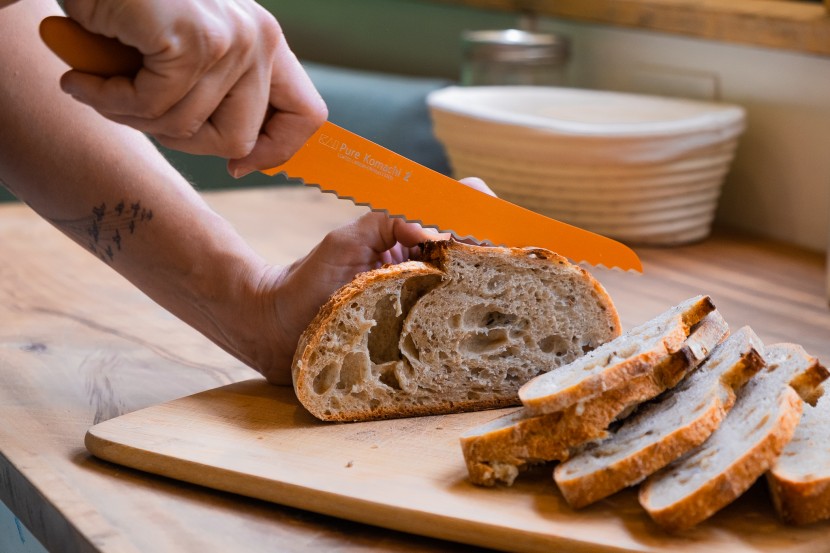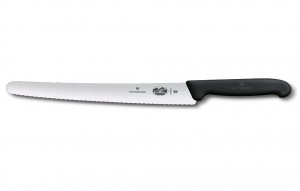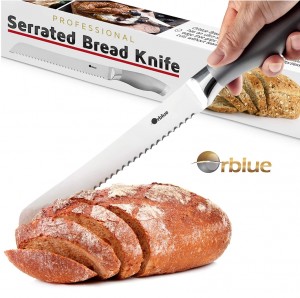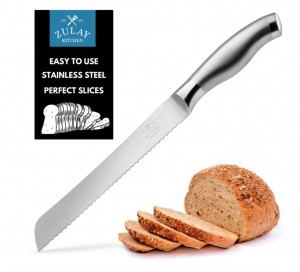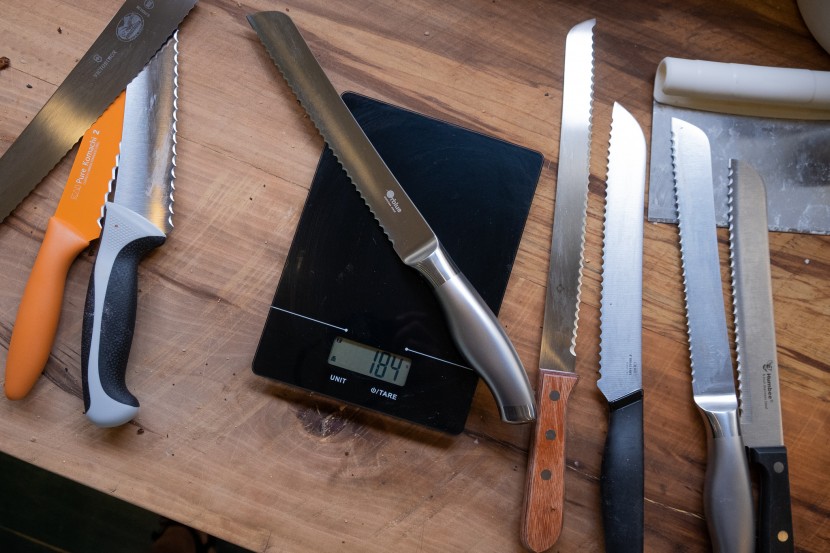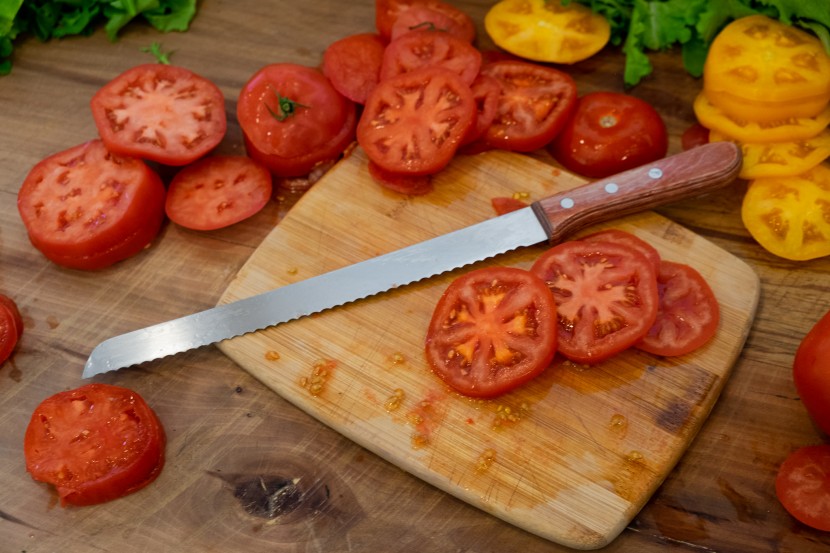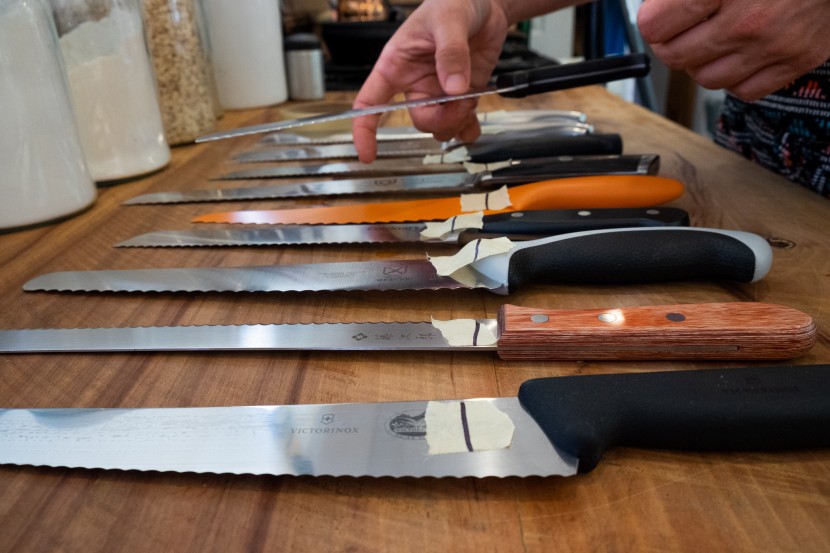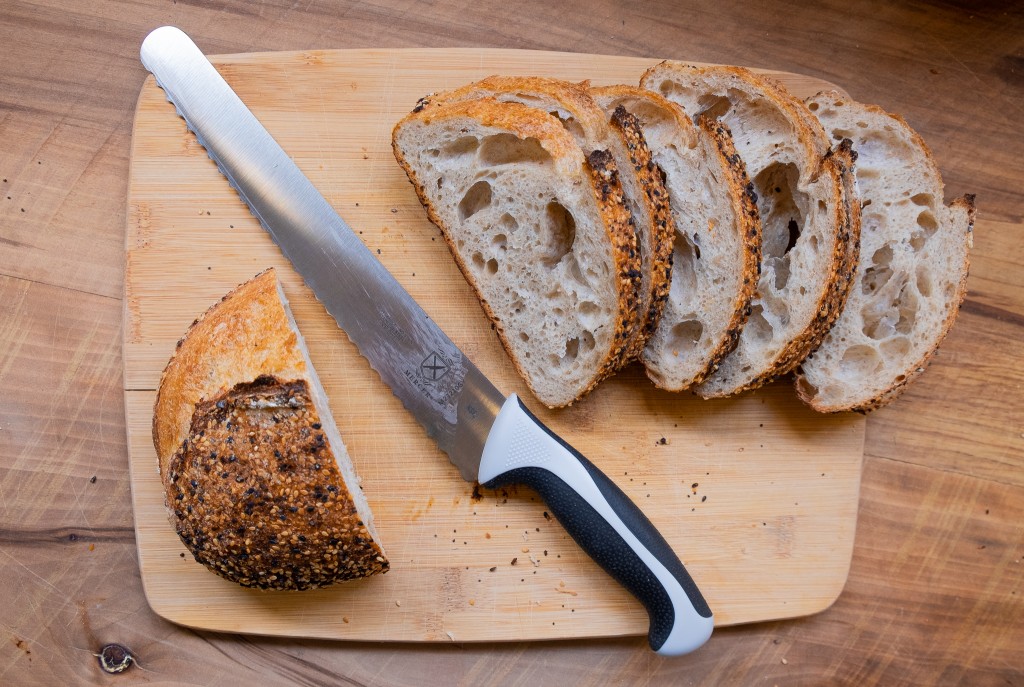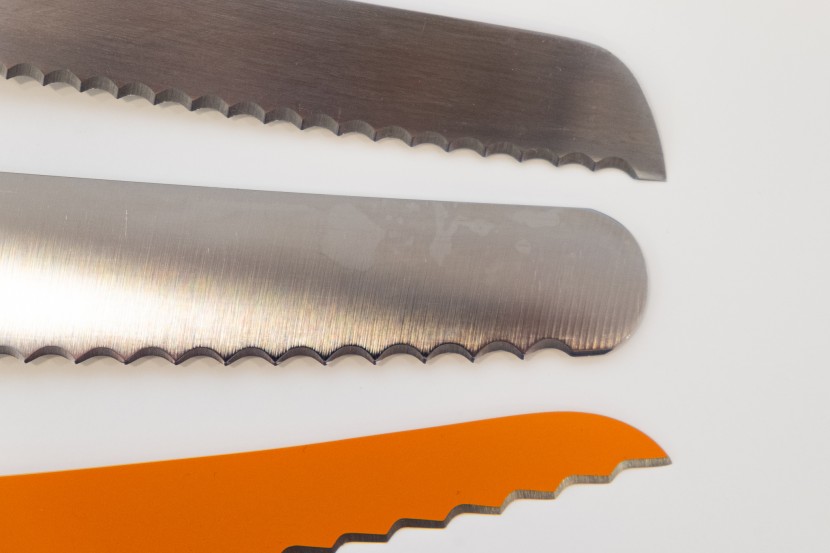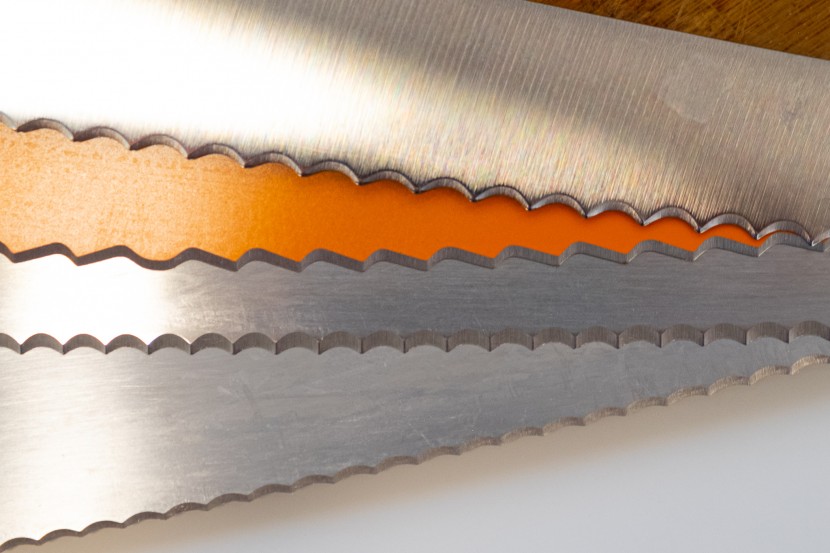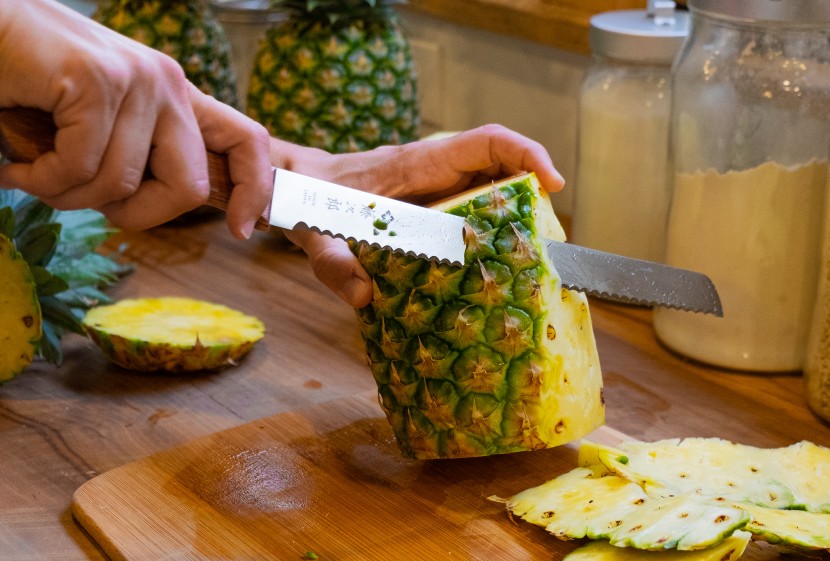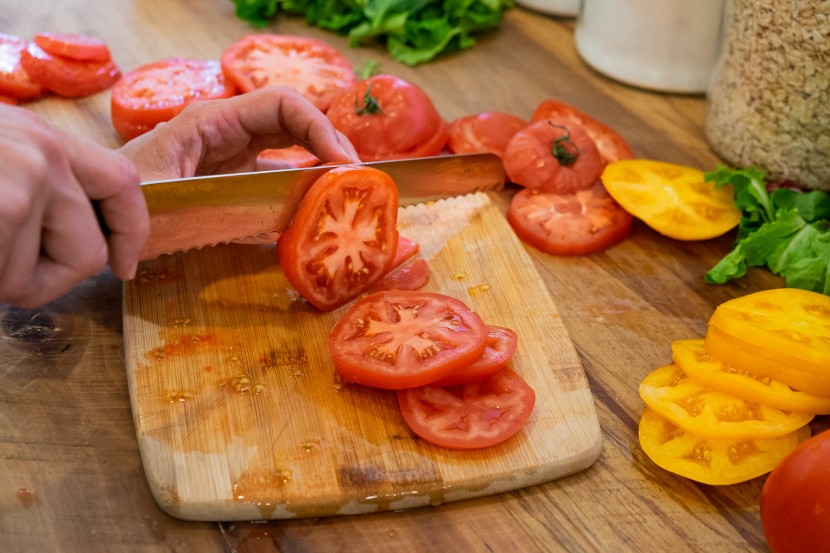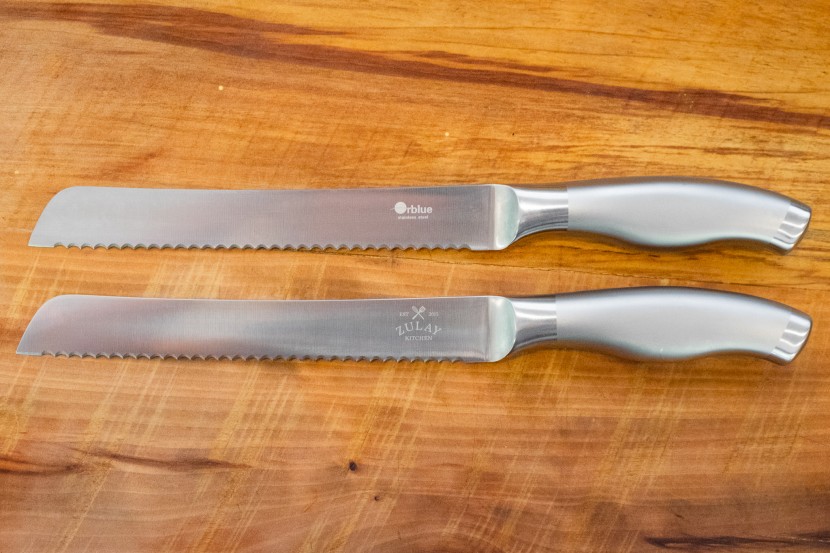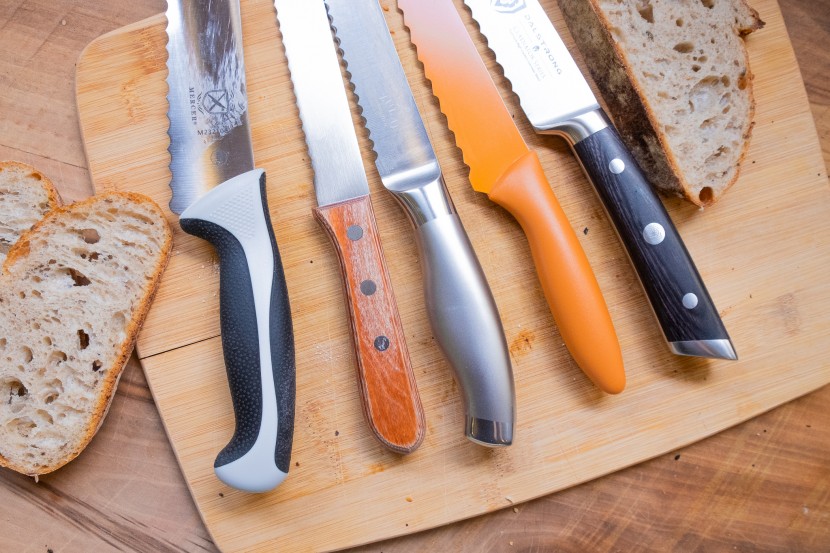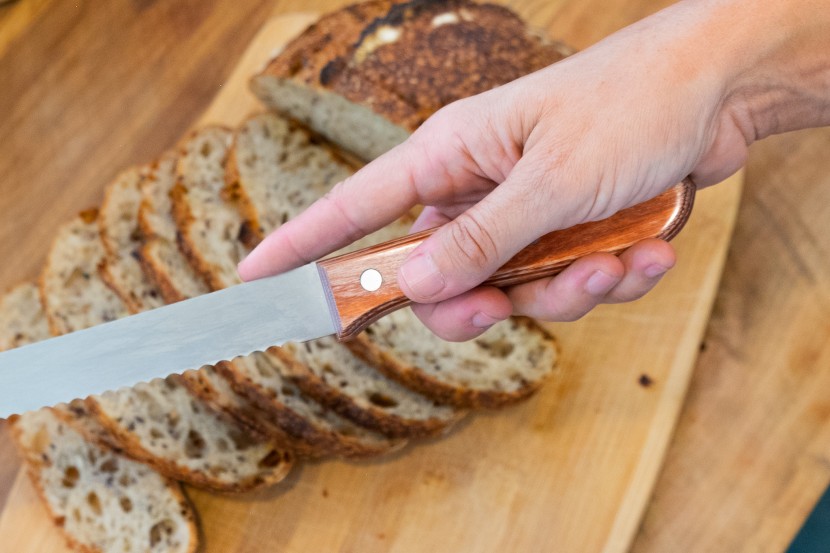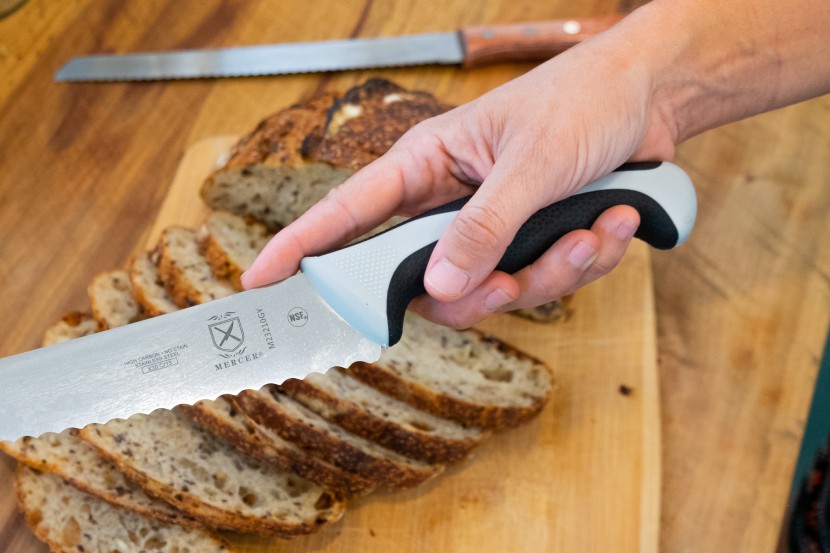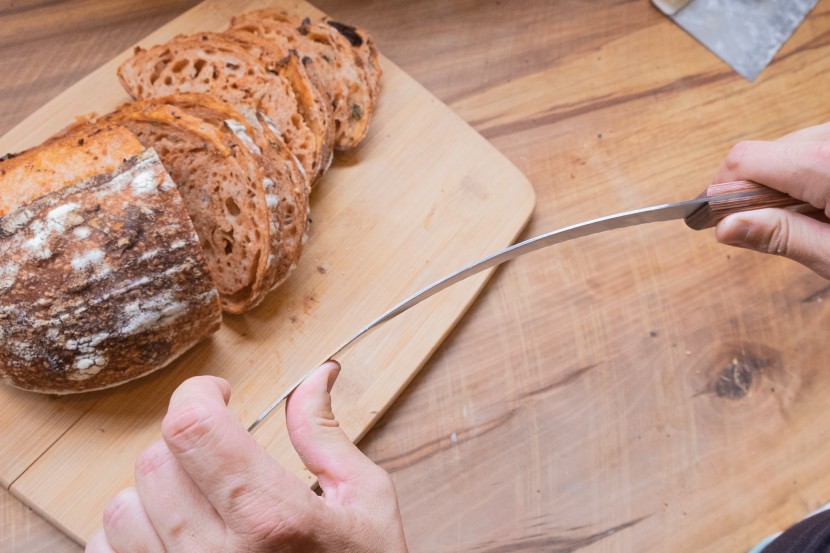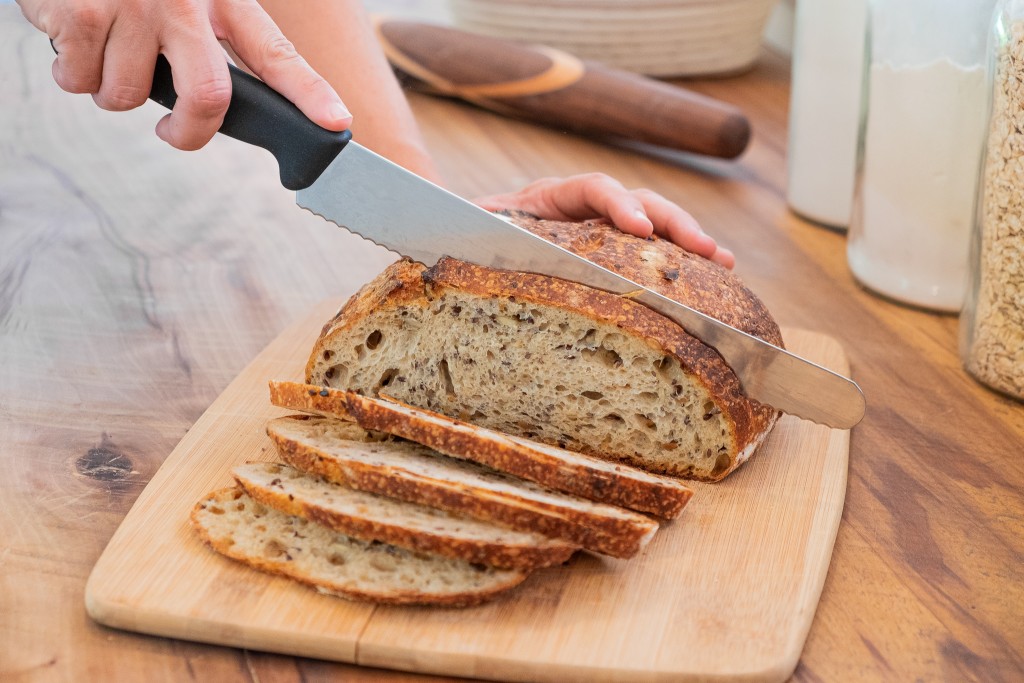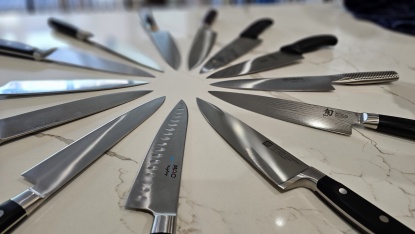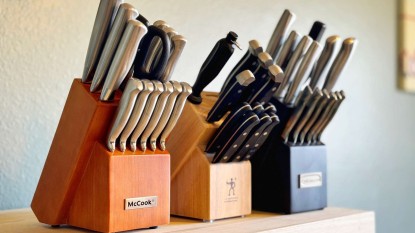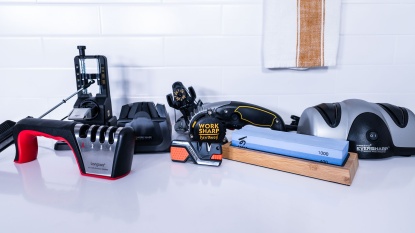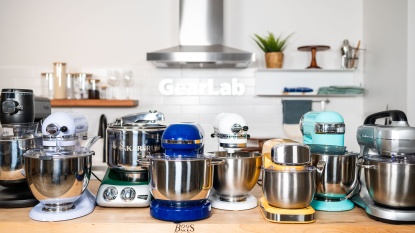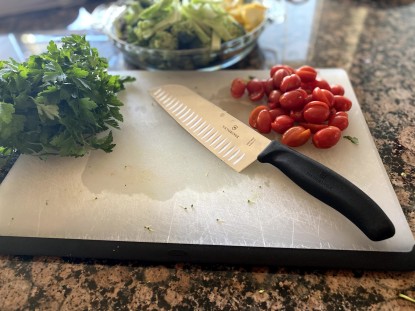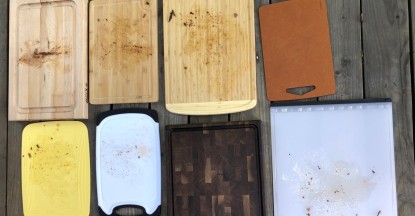On the hunt for the best bread knife for your baking habits? We purchased the top 8 serrated bread knives on the market. Through extensive hands-on testing, we separate the wheat from the chaff. After conducting online research, reading product reviews, and manufacturer information for over 30 knives, we selected the most popular, highest-rated models and spent hours slicing through crusty homebaked sourdough loaves, fully ripened heirloom tomatoes, and tough pineapples. We weighed, balanced, and measured each knife, all to bring you the most comprehensive bread knife review to help you select the bread knife that will meet your needs in the kitchen and your budget considerations.
What better way to use your bread knife than to slice freshly baked bread? If you are a baking aficionado, check out our favorite bread machines or alternatively, take a look at the best dutch ovens to elevate your breadmaking game. Out of all the most common cooking utensils, knives tend to take a beating, and nothing is more frustrating than a dull knife. We tested knife sharpeners around to keep your kitchen workhorse in sharp shape.
Best Bread Knives
Blade Length: 9.25 inches | Weight: 5.7 ounces
We crowned the Japanese Tojiro Bread Slicer F-737 our favorite bread knife. The long, thin, flexible blade and sharp serrated edge can slice crusty sourdough, heavy pineapples, and the softest vine-ripened tomatoes with speed, accuracy, and minimal pressure. The Tojiro blade is one of the most flexible we tested, so we wondered if it could handle heavy-duty jobs like cutting the skin off a pineapple. It performed better than the other knives we tested. This is the blade we found ourselves reaching for most often and that brought us the most joy.
It has a simple shape to its small handle, rendering it less secure-feeling in your hand. However, we found that the lightweight, high-performing blade compensates for the lack of ergonomic security because it doesn't require a tight hold on the handle when slicing to be effective.
Blade Length: 7.25 inches | Weight: 5.9 ounces
For the budget shopper looking for a serrated blade that handles a wide variety of kitchen duties, the Cuisinart C77TR-8BD Triple Rivet delivers in both performance and price. The serrations are sharp and quick to bite into the skin of soft tomatoes or the hard crust of artisan bread. The construction is solid with a full tang, a well-proportioned handle, a bolster to keep the knife balanced, and a long blade suitable for most tasks. The appearance of this knife is also appealing; it has that classic, quality knife look with no flashy colors or unusual shapes.
While the Cuisinart performs above average, its thicker, non-tapered blade causes it to lag when cutting deep into a loaf of bread and hinders its ability to change direction when cutting through a dense pineapple. The 7.25-inch blade length can be a bit short if you plan to cut large loaves of bread or level cakes, but for most tasks, 7 inches is enough to get through.
Blade Length: 9.25 inches | Weight: 5.7 ounces
The Mercer Millennia Wavy Edge Wide Bread Knife, with its lengthy blade and immaculate slicing action, finished towards the top of our test group. This is one of the longest blades we tested, and it made quick work of even the largest sourdough boules. The blade is thicker toward the heel and tapers toward the tip, giving it strength and durability while minimizing lag. Whether slicing tomatoes, pineapple, or bread, the Mercer is a top performer across the board.
Due to the positioning of the handle, the Mercer Millennia offers more clearance between your fingers and the cutting board than any other knife we tested. If you're seeking an aesthetically pleasing bread knife to display in your kitchen, the plastic dual-grey-toned handle might not be what you're looking for. However, the comfort and performance of this model make up for the lack of flashy presentation. You buy the Mercer for its great performance, not as eye candy on your magnetic block.
Blade Length: 9.25 inches | Weight: 8.4 ounces
The manufacturing and quality components of the Dalstrong Gladiator Series 10" Serrated make it a great choice if you're looking for a substantial knife that will remain sharp for several years. The forged German steel weighs more than stamped steel and is hardened for added longevity. Like other long models we tried, we like the 9" length for its ability to slice large loaves of bread and level cakes. The additional weight on this blade can be helpful when more pressure is required on tough jobs like cutting through a pineapple.
However, some may feel that the 8.4-ounce Dalstrong knife is too hefty for comfort, and with its smooth, straight handle, you may wish it had a more ergonomic grip to steady the weight in your hand. Still, the quality of this knife is undeniable, and we'd expect it to be a long-standing tool in the kitchen.
Blade Length: 8 inches | Weight: 2.5 ounces
For those jobs that need more precision, like cutting tomatoes, slicing up smaller loaves of bread, or skinning pineapples while losing a minimal amount of fruit, the Pure Komachi 2 Series Bread Knife is a solid choice. Its low weight and small size make it easy to wield on a crowded countertop, and the thin, flexible blade allows you to adjust the direction of your cut while in the middle of a pineapple.
While the small blade offers excellent control, it isn't long enough to slice anything larger than small loaves or baguettes. The handle is smooth, straight, and on the small side, which is fine for light work, but when slicing up an entire loaf of hearty bread, you may want more structure to grab onto. And although some people may be happy to add a single orange knife to their set, the bright color may not blend in easily with the rest of your kitchen equipment.
Blade Length: 9.75 inches | Weight: 4.5 ounces
While it isn't the highest performing knife in the test, the Victorinox Swiss Army 10-1/4" Serrated Bread Knife can certainly hold its own. It offers one of the longest blades in our review, which we like for its ability to level cakes and slice larger loaves of bread. The knife's thin, tapered blade is sharp and slices well.
The Victorinox knife is only a partial tang, and the handle is made of lower-quality plastic than we would expect in a knife at this price. Regardless, the handle is still comfortable and large enough for various hand sizes.
Blade Length: 7 inches | Weight: 6.5 ouncesWe really like the look of one-piece stainless steel knives for certain kitchen aesthetics. The Orblue Serrated Bread Knife slices decently and offers a balanced feel at a reasonable price. We also appreciate the ergonomically shaped handle that feels comfortable even after the effort of slicing up a whole loaf of bread.
When our selection of knives arrived, we were perplexed to receive what seemed like two of the exact same knife. Aside from the different brand names stamped on the blades, the Orblue and Zulay knives appear identical. This doesn't detract from either knife's performance. Still, it has us questioning the care that went into designing and manufacturing a knife that is seemingly sold to multiple companies to print their logo on.
Blade Length: 7 inches | Weight: 6.5 ouncesLike its twin, the Zulay Serrated 8-inch Bread Knife is an attractive one-piece stainless-steel knife. It is offered at a budget-friendly price and performed fairly well on all the foods in our test. The shaped handle is smooth and comfortable to hold even when cutting harder foods like tough pineapple skin.
The fact that this knife appears to be made by one manufacturer and then sold to multiple other companies to stamp their logo on doesn't inherently lower its quality or performance. Still, it does make us question the expertise in knives that Zulay can actually provide.
Why Trust GearLab
We begin our review process by researching the top bread knives on the market, reading user reviews, and finding out what other experts have to say about the features that make a great bread knife. We searched for products that will not only cut bread but can also slice soft tomatoes, level a cake, cut down a pineapple, and hopefully last you for years to come. We purchased eight knives and got busy baking some fresh loaves, slicing them down into the thinnest slices the knives could manage, cutting tomatoes for more BLTs than we could eat, and chopping pineapples for fresh, succulent snacking. We measured each knife's weight, blade length, and balance point and assessed these measurements against their performance. We took in all our testing data and used that to select our favorites. Now, we're ready to explain why some models easily cut crusty bread while others aren't up to the task.
Elizabeth Paashaus, our lead tester, is a passionate home-baker who enjoys constantly testing new variations of her sourdough loaves to achieve the perfect crumb, crust, and flavor combination. After the hours of stretching, folding, and waiting that go into making the perfect loaf, Elizabeth isn't willing to let a sub-par knife destroy her art. In addition to bread baking, she dedicates hours in the kitchen cooking new recipes for her family, preparing backcountry meals from scratch, and whipping up delicious desserts to meet her late-night craving needs. She pairs her love for cooking with her enjoyment of analyzing data to create some of the best product reviews filled with real-world advice to help you make a smart buying decision.
Analysis and Test Results
Our testing centered not only around slicing bread but also on the variety of other foods that can be cut with a quality serrated knife. In addition to real-world use on food to test sharpness, we found the balance point of each knife, assessed the comfort and analyzed the shape and material of each handle, and measured each blade's length and thickness to assess their performance characteristics.
Sharpness
We found blade sharpness to be, by far, the most important aspect of bread knife performance. A sharper blade can make the difference between easily slicing through food or having to really lean into the sawing, which increases the likelihood of the knife slipping and causing injuries. The sharper the blade, the safer your knife will be.
The top two performers for slicing bread are the Tojiro and Mercer knives. These knives allow you to cut smooth, thin slices with low crumb creation. They keep the surfaces of the slices smooth and even, which is critical to making the perfect grilled sandwich.
Our pineapple test ended with the same two knives as the top performers, but some others stood out as close seconds. The Komachi knife, with its thin, flexible blade, really shone, similar to the thin blade of the Tojiro, when cutting around the curves as we sliced off the tough skin. Victorinox's bread knife also performed well on the pineapple with very smooth and easy cuts. The weight of the heavy Dalstrong knife aids in the force needed to cut a pineapple's skin, but because the blade isn't flexible, it provides less control than some.
Tomatoes can be tricky to slice well due to their soft flesh and skin's surface tension. A good serrated knife can quickly pierce the skin and require minimal pressure to avoid mashing the interior. The Tojiro and Mercer knives slice tomatoes like butter, even towards the last few slices when you have very little tomato left to grip with your fingers. The Cuisinart and Pure Komachi knives also performed well on tomatoes but just weren't quite as smooth as the other two. Some knives struggled to bite into the tomato skin or drifted while slicing, making even slices difficult and the last few slices dangerous.
Balance
Balance, in a knife, refers to the feel of the knife in your hand. Does the blade feel heavy, or is the handle hard to continually lift while keeping the lightweight blade down? A well-balanced feeling knife typically has its balance point right where the blade meets the handle. While this is still an important factor in a serrated bread knife, we found an unbalanced bread knife to be less noticeable than an unbalanced chef or santoku knife due to the types of motions made with these different blades.
Many of the knives we tested—the Tojiro, Mercer, Cuisinart, Komachi, and Dalstrong—are well-balanced. However, the unbalanced Victorinox, with most of its weight far forward onto the blade, is still one of our favorite knives.
Comfort
Comfort is subjective and can be dependent on hand size. To test this metric, we had people with small, medium, and large hands grip each knife and offer feedback on the fit.
A portion of a knife handle's comfort lies in the material. The Mercer utilizes a rubbery non-slip handle material. It may not look sleek or high-end, but it does add to the functionality of a knife you may use with wet hands.
Another factor that contributes to comfort is the shape of the handle. One that is ergonomically shaped like your hand that also offers a bolster toward the blade and a curved end toward the butt of the knife to keep your hand in place will feel the most secure for tough jobs like cutting into butternut squash and pineapple. The Mercer knife features our favorite and most comfortable grip for slicing tasks that require force. The Victorinox also offers a nice shape to keep your hand positioned correctly on the handle, but the overall shape is square and less ergonomic. The identical twin knives from Orblue and Zulay use a stainless-steel handle that is comfortably rounded and feels good in your hand. Japanese bread knives like the Tojiro and the Pure Komachi have small straight handles that seem like they'd be hard to hold, but we found that when your blade is sharp and thin, it slices so easily that little pressure is needed, and the small handle offers more finesse.
For folks with larger hands, the Mercer knife offers the largest grip overall, and the Victorinox handle is just as long but not as large in diameter, so it could still be a good fit for small-handled people. Even though we will continue to rave about the Tojiro knife, we must admit that its handle is a bit short for people with larger hands.
Blade Length & Thickness
Whether purchased from a baker or cooked in your oven at home, many artisan loaves of bread will be larger than seven inches in diameter. Bread knives tend to run between seven inches to ten inches in blade length. We feel that anything under nine inches just isn't long enough for easy slicing unless you only cut smaller loaves like those baked in a bread pan. The Tojiro, Dalstrong, Mercer, and Victorinox bread knives all have blades in the nine to ten-inch range that we find just about perfect.
A blade's thickness plays almost as big a role as sharpness in knife performance. Knives with thicker blades may be sharp and cut into food easily, but they tend to create more resistance as you slice further in. The extremely thin and flexible Japanese bread knife blades like on the Tojiro and Pure Komachi knives continue to slice just as easily at the bottom of crusty sourdoughs and tomatoes as they do from the start. The Victorinox bread knife has a thicker blade toward the heel and tapers toward the tip. It has very little drag when slicing, and on smaller items like tomatoes, you can use the thinner section near the tip for the smoothest cutting.
Conclusion
Finding a bread knife in a market saturated with seemingly similar knives can be daunting. And there certainly isn't just one that suits everyone's budget and cooking style. However, we hope this review helps you find the knife that's just right for you. We did the research, spent hours doing hands-on testing, and broke down the most important features to look for. Now that you have more information about how each of these knives perform, we hope you feel confident in selecting the right serrated blade for your kitchen.
—Elizabeth Paashaus


